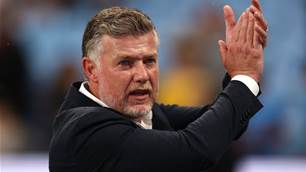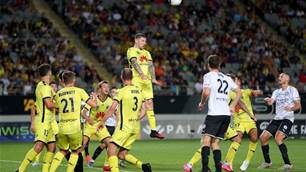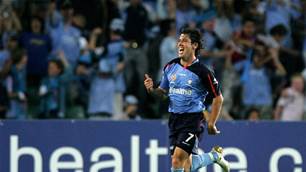EXCLUSIVE: All-Whites coach Ricki Herbert says he'd be surprised if New Zealand are still in the Oceania Confederation in ten years time, fuelling the push to join the AFC.
In part two of our chat with dual Wellington Phoenix and All-Whites coach Ricki Herbert, he tells us about November 14, the changing face of NZ football and the challenges and potential of playing in the AFC.
With the recent success of the All-Whites, Auckland City and Phoenix, have you finally found credibility internationally and domestically? And is it fair to question it in the first place?
It is, because you're always fighting for that. I think it's something we've always lacked, that professional football. Playing in this competition [the A-League], I don't think we lack that now. I think we're an integral part of that. And I think football people do respect that.
Nationally, it's hard to describe but November 14 was quite a transformation of sport in New Zealand. While it was a football event, it transformed the country, be it in a sell-out stadium, watching a TV set or sitting in a bar and that message has flown through pretty consistently from non-football people - which is exciting, even to the extent that some have said it was the best event they've ever been to.
So that helps and while the outcome was a World Cup opportunity after almost 30 years, what that evening produced, to capture people's imagination and it just happened to be football, that was really cool for our sport.
What was the one thing you remember most about November 14?
Whilst I was really emotional and said a few words I've never said before on TV, it was just reflecting on everyone's else's kind of emotion. It was an incredibly strong, passionate position to be in. Ryan Nelson, leader of an English Premier League club, he was just so elated and he's playing against the best week in, week out to Andy Barron who comes on and plays locally for Team Wellington who comes on and solidifies the result.
Just sitting back, I've never been in a stadium with that feeling. And we played in front of 105,000 in Indonesia in 1981 in a qualifier but not even remotely close to the 35,000 that were there.
You set it up in Manama with a 0-0 result, tell us about the expectations that result drove?
I think as soon as we got back from Manama with 0-0 - which I don't think anyone even in our country, let's be honest, ever thought we'd get even remotely close to qualifying - the players and the management always knew we'd be a good chance.
When we came back, there was an escalation in ticket sales. And within two weeks, the stadium was sold out. Then there was this 'One shot for glory' web campaign and one thing, which was really cool, was that I struggled to see anyone in the stadium not wearing white.
And that's quite a representation of what that evening meant to a lot of people.
You went from your traditional 4-4-2 to a 3-4-3 against Bahrain. Is that a template for when you play Slovakia, Italy and Paraguay at the World Cup in June?
We wanted a strategy that would get us to the World Cup. But I always said to the players you can play a 3-4-3, 4-4-2, 4-3-3, but I put that out as a blueprint, it's only a structure, a starting platform for the team. Then, inside of that are the tactics you want to employ but the third and most crucial thing is the application of the players - otherwise the first two mean nothing.
I looked at the players and the quality of the players and I think as we're building now, that front part of the pitch is a lot more livelier. We've got some real quality there, I think the young boy Chris Wood has just signed a new contract at West Brom. So these sort of players are starting to come. He's incredibly confident but not a cocky kid at all.
Then we broke down what we thought they'd be like. We'd seen them. For us, they were no different home or away against Saudi. They were very offensive minded and in fact probably a little more offensive away which was surprising. They had a couple of key players.
So when I played [Leo] Bertos on the right side in the away game people were like, 'Well, he's not a full-back'. Then we got the 0-0 and they were like 'Leo needs to get further forward and get crosses in'.
But when you break that down, the strategy, the tactics for Leo was to do nothing else but mark a left hand side midfield player who was technically very good, had pace and would arguably be the game-winning player for them if we didn't get control. So I didn't play a back four, and I played somebody who could athletically match that player. And he had an outstanding game.
At home, tactically we played the same way but I changed Leo's tactics. 'Don't come so deep, play a little more in the middle of the park and attack when you have the ball' were the instructions.
The pundits failed to pick up the absolutely crucial formational role he played?
Yes, so rather than saying 'Geez he was the best player marking the wide player in Manama' it was, 'Leo didn't get any crosses in'. He wasn't asked to.
People can be pigeon-holed. I guess I took Leo out of his comfort zone and said if you can have an effective game, I think the team can go on and get a result tonight. If you don't, you could let us all down. And that's a powerful thing for a manager to tell you. There's a lot riding on your shoulders. So mentally and physically you have to digest that and make it happen.
How did he react to this responsibility?
I think he was extremely positive. I think he was a little, 'Mmm' but we worked hard with him and the same on Tony's [Lochhead's] side who had to play slightly more forward and not a natural full back.
But we have three experienced [central defensive] players in Nelson, Sigmund and Vicelich playing and controlling and we didn't concede a goal in 180 minutes, which was a big, big surprise to people.
After playing Bahrain, did it give you an appetite for playing Asian football?
We went to Jordan before the Bahrain game and won 3-1 - with 10 men. Anywhere around that part of the world I really like because it's evolving and challenging for lots of reasons. It'll be interesting to see how Australia goes against Kuwait. So we've played three games [against AFC] opposition and not lost and conceded just one.
But we'd only played eight games when Bahrain had played 18 games when we met. So you're always behind the eight ball but the expectations are always the same. We need to get to the World Cup while Bahrain was investing and developing and we're not doing that.
How are things changing in New Zealand football?
I think there've been some really good, obvious signs that ... in my first year in 2005, we played one game with the national team when we played Australia in England. But now, what can come to the country financially and how that's spent that can move the game forward over the next 10 to 20 years - hopefully, that's done correctly.
But the team needs investing in because it's the type of income you can get. If you're not prepared to invest in it then you are probably not going to reap those rewards. And if we don't get those rewards, we'll always struggle to move forward.
So would you reap more of those rewards being an AFC nation?
I think the signs are there that, and you see it with the younger teams in Australia, that it doesn't happen [success on the park] straight away. Many of the under-age rep teams failed in Asia. But slowly now the mileage is coming and there is much more qualification.
But in 10 years time I think we'll be having this conversation going, 'Wow, wasn't the grounding right, wasn't the competition right ... but if we're here in 10 years, talking about qualifying out of Oceania , it makes it difficult because it's a long qualifying campaign and there's a lot of geographical travel for our players now that more are getting offshore. To bring someone from London to the Solomon island is just tough.
I guess the tacit understanding is you could do without some of your European stars for such games anyway, robbing you of regular game time for your best XI...
I mean, we only had the best team on the park for the qualifiers against Bahrain, never before. Never before in my tenure have I had the best players. And you've got to watch that and be a little careful. It backfired on Australia when we knocked them out of the Confederations Cup [in 2002] with them playing a local team. You lend yourself to be vulnerable and personally the responsibility of the job, from my point of view, when you have $10-20m riding on the line, I don't think it's a good call.
You've got a friendly with Mexico in LA on March 3. Why this opposition?
I wanted a big-hitter. They are 17 in the world, at the World Cup, I wanted to come off that qualifier with a game that's like 'wow, here's a reality of what it's going to be like', rather than playing a nation that we should beat. Not interested in that. Whatever the result, that'll get our momentum going.
After that, what happens with your preparation for the World Cup?
We are proposing to get a fortnight at the back end of the season. I've got to look at players who are non-European. And they've been in for a long period of time. Bear in mind, we were at the Confederations Cup [in the 2009 off-season]. Take Tim Brown. He's come off a prior A-League season, then gone into a physiological training program because we didn't have anything for them to do - which wasn't ideal.
He's trained the house down, to then go on a tour at the Confederations Cup, coming back, have a week off, start pre-season then another whole A-League season and a World Cup qualifying campaign. So somewhere there needs to be a little bit of retention just to allow them to come back up again.
So finals or no finals, we'll probably give them a break. And then I'm looking to take a non European team in a training camp for two to three weeks where we'll play whoever we can play. Opposition is kind of irrelevant but I can keep them ticking over before giving them a break for a week or two before we go off to join the main team around May 14.
It's quite a balancing act...
It's difficult. But the thing is, geographically, it's never going to change in our lives so we've always got to find a modified way of making it the best.
We're hoping to go into Europe where we're hoping to play some European teams to mirror Italy and Slovakia and then we'll fly down to Jo'Burg and set up camp there. So we're a little different and it's not for me to say what the Australian players how they see it. Where are they going to play? Will it be better than the A-League?
We have the players overseas, and I'm looking at bringing in a boy called Tommy Smith from Ipswich with Roy Keane. Tall, left-sided defender, perfect for what we need. Just say he makes the team we'll have pretty much six players will come out of this part of the world, so if we can keep them together and we know that Ryan [Nelson] and Rory [Fallon] will play every week...
Onto Phoenix. After the Fury game this Friday, 10 days on the road for three crucial games: Perth, Melbourne then off to Christchurch to play Adelaide...
We come home for one day then we fly to Christchurch, which is not ideal. It's a tough time for us but European players do it. If we perform, we win. I don't fear the travel even though we haven't got as many points on the road. You've got to break that mindset.
It's a crazy league - you can't get a concept of what's going to happen. You can't ever rely on anyone to help you because that's not going to happen.
Related Articles

Victory shake-up: Talay in line to replace Popovic at ailing A-League giants

Is New Zealand ready for its own A-League derby?













